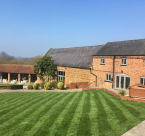Find out how we can support your community on a wide range of issues....
Village Halls Survey Report 2020

In October 2020, National ACRE published the results of the 4th National Village Halls Survey. This audit of community buildings takes place once every ten years and provides an important insight into the health of these vital community resources. Commissioned by National ACRE, the survey was funded by Power to Change and carried out by the Centre for Regional Economic and Social Research, Sheffield Hallam University.
Just before lockdown 2,109 halls took part in the National Village Halls Survey 2020, providing a detailed snapshot of the operations and management of community buildings across the country. The survey found that village halls make a significant contribution to the economy.
At least 10,000 individuals earn a living connected to the use of these community buildings, from Pilates and Yoga teachers to people running dog training classes. A further 4,500 people are employed as cleaners, caretakers and managers.
Nearly half of all halls serve as a venue for private parties, and a quarter host weddings; events which provide commercial opportunities for local businesses.
One in ten are also home to community businesses; enterprises which are owned and run by residents for local community benefit, such as shops, cafes, and post offices.
Additionally, 70% of respondents had undertaken improvement work, extensions, or new halls in the last five years, contributing well over £46 million to the UK economy. Local builders were often used.
Those living in rural areas are at heightened risk of social isolation, which can lead to poor health, loss of independence and lower quality of life, according to the Local Government Association.
This makes the work of village halls particularly important. An astonishing 60% of respondents stated that their halls are the only meeting place for their community, with activities such as coffee mornings and luncheon clubs helping to address loneliness among vulnerable groups.
Volunteers also play an important function in maintaining the buildings, carrying out small repairs, maintenance and checks within 94% of respondent halls. Two out of five have volunteer caretakers or handypersons. This involvement generates considerable wellbeing benefit for those who take part. Read the report in full here.









